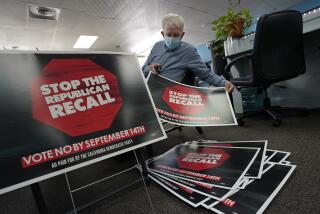2011, the year of the recall
- Share via
This year an enraged electorate has made its presence felt, through Occupying events and a roller-coaster Republican presidential primary process. But the most obvious sign of political activism has been the unprecedented use of recall elections. The numbers tell the tale: In 2011, at least 150 elected officials in 17 states faced recall votes.
Recalls stretched from the Arizona state Senate to the Miami-Dade mayor’s office to the school board in Grenora, N.D. Eleven state legislators faced recall — including nine in Wisconsin. Thirty mayors were subject to recall votes in 2011. At least three municipalities adopted the recall. Nineteen U.S. states allow recalls, with more — South Carolina among them — seriously considering adopting the process. It’s even grown internationally, with governments in India, Britain and Australia all considering adopting the recall in some form.
Next year may be an even bigger one for recalls. Nationally, there are more than 100 active recall petitions seeking signatures, and 22 have already been scheduled in 2012. Most notably, Wisconsin Gov. Scott Walker is likely to be only the third governor in U.S. history to face a recall vote.
Voter anger, especially over the downturn in the economy, unquestionably fuels the recall mania. But voters have been angry plenty of times in the past; why has the recall suddenly become so popular?
The reality is that the 2011 recalls are the culmination of a 30-year trend. Since states first adopted the recall — Oregon and Michigan, in 1908 — a total of 32 state legislators have faced recall elections. From 1908 to 1980, there were just seven state recall attempts. From 1981 through 2009, there were 14. The 11 state recall votes this year nearly doubled the total for any other decade.
The recall’s increasing popularity and effectiveness is directly connected to technology. Campaigning, fundraising and, critically for the recall, signature gathering have become easier thanks to the digital revolution. It may seem like a paradox: At the same time that we are witnessing billion-dollar campaigns for president, the most basic political action launched by non-professionals is becoming cheaper and more effective.
Thanks to the Internet, email and social media, previously unconnected voters can easily be drawn into a fight over a politician’s alleged misdeeds. Smartphones and spreadsheets and demographic data at a political consultant’s fingertips can maximize signature-gathering efforts.
And the more recall elections there are, the more it sinks in with voters: Recalls cause change. Incumbents generally have a big advantage and get reelected when they run in regular elections. The recall turns that stat on its head.
It’s true that in record-setting Wisconsin this year, only two out of nine state Senate recall elections overturned the incumbent, but over time, recalls in the U.S. have had a better than 50% success rate. In 2011, 84 officials lost their seats to recall (75 were kicked out by voters, and another nine quit before the recall vote was held). Going back to the historical data, of the 32 state legislators who faced recall votes, 17 were kicked out. And both of the governors who have so far faced recall elections, California’s Gray Davis in 2003 and North Dakota’s Lynn Frazier in 1921, lost their jobs.
The success of recalls is partly explained by the nature of the election. Recalls are generally held as special elections, which draw fewer voters and attract those most committed to whatever cause is on the ballot. Unsurprisingly, that favors those who supported the recall in the first place. There are counter-examples, most prominently the circus-like recall of Gray Davis, in which turnout was higher than at his election. But generally turnout is heavily depressed.
Voter anger may have helped drive the record-setting year for recalls, and it certainly made life miserable for 150 officials throughout the country. But the growth of the recall is a long-developing trend. Don’t expect it to disappear any time soon.
Joshua Spivak is a senior fellow at the Hugh L. Carey Institute for Government Reform at Wagner College in Staten Island, N.Y., and blogs at https://recallelections.blogspot.com/
More to Read
A cure for the common opinion
Get thought-provoking perspectives with our weekly newsletter.
You may occasionally receive promotional content from the Los Angeles Times.






